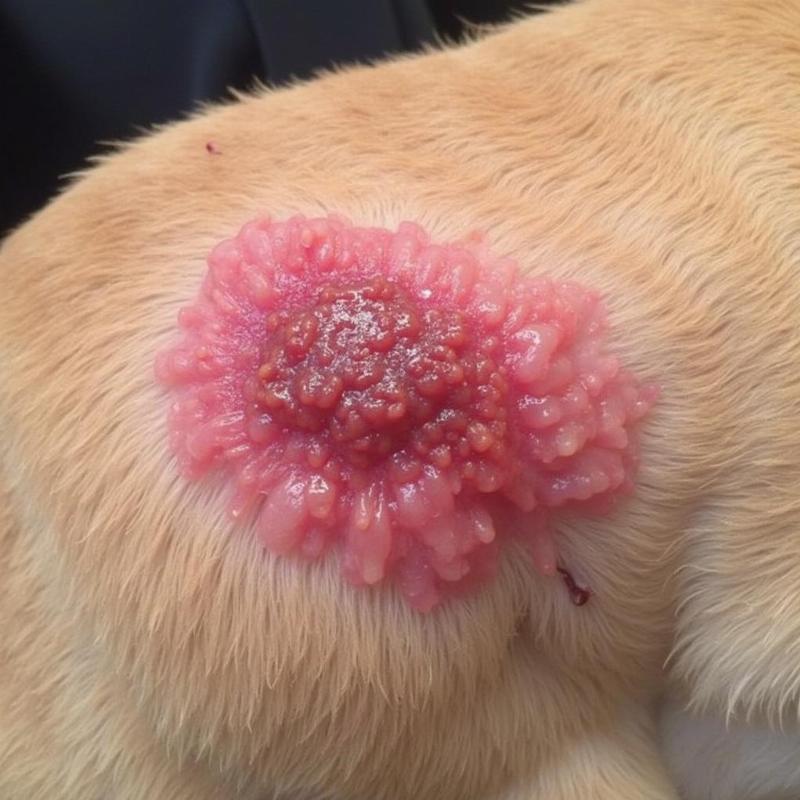Hot spots on dogs, also known as acute moist dermatitis, are a common skin issue that can cause discomfort and distress. Many pet owners consider tea tree oil as a natural remedy. However, while tea tree oil has some antiseptic properties, its use on dogs, especially for hot spots, requires caution. Understanding the potential risks and benefits is crucial for responsible pet care in the US.
Understanding Hot Spots in Dogs
Hot spots appear as inflamed, red, itchy, and often oozing lesions on a dog’s skin. They can develop quickly and spread if left untreated. Common causes include allergies, flea bites, bacterial infections, excessive licking or chewing due to boredom or stress, and underlying skin conditions.  Hình ảnh vùng da bị hot spot trên chó Recognizing the signs early and seeking veterinary advice is essential.
Hình ảnh vùng da bị hot spot trên chó Recognizing the signs early and seeking veterinary advice is essential.
Tea Tree Oil: Potential Benefits and Risks
Tea tree oil, derived from the Australian tea tree (Melaleuca alternifolia), possesses antiseptic and antifungal properties. These qualities have led to its use in various human skincare products and some pet products. However, dogs are much more sensitive to tea tree oil than humans. Even diluted tea tree oil can cause toxicity in dogs if ingested or absorbed through the skin, especially in sensitive breeds. Symptoms of tea tree oil toxicity in dogs include weakness, tremors, incoordination, vomiting, and even liver damage. Therefore, using tea tree oil directly on your dog’s hot spots, even in diluted form, is generally not recommended.
Safe Alternatives for Treating Hot Spots
Instead of risking tea tree oil application, several safe and effective treatments are available for canine hot spots in the US. Veterinary-approved shampoos and sprays specifically formulated for hot spots are a good starting point. These products often contain gentle cleansing agents and soothing ingredients that can help alleviate itching and inflammation. best shampoo for dogs with hot spots Clipping the fur around the affected area can also help prevent further irritation and allow for better air circulation, promoting healing. Keeping the area clean and dry is crucial. Your veterinarian might also prescribe antibiotics or anti-inflammatory medications if the hot spot is infected or severely inflamed.
When to See a Vet
If your dog develops a hot spot, it’s always best to consult with a veterinarian, especially if it’s the first time or if the hot spot seems severe. A veterinarian can diagnose the underlying cause of the hot spot and recommend the most appropriate treatment plan. tea tree spray for dogs Delaying veterinary care can lead to complications, such as secondary bacterial infections and increased discomfort for your furry friend.
Preventing Hot Spots in Dogs
Preventing hot spots is often easier than treating them. Regular grooming, flea and tick prevention, and managing allergies are crucial steps. Providing a balanced diet and ensuring your dog gets enough exercise and mental stimulation can also help reduce stress and boredom-related licking or chewing. dog shampoo with tea tree oil Furthermore, addressing underlying skin conditions promptly can prevent hot spots from developing in the first place.
Conclusion
While tea tree oil might seem like a natural solution for hot spots on dogs, its potential toxicity outweighs any perceived benefits. tea tree oil dog hot spot Always prioritize your dog’s safety and consult with a veterinarian for appropriate treatment options for hot spots. Utilizing safe and effective alternatives, along with preventive measures, can keep your canine companion’s skin healthy and comfortable.
FAQs
-
Can I use diluted tea tree oil on my dog’s hot spots? It’s best to avoid using tea tree oil on dogs altogether due to their sensitivity and potential toxicity.
-
What are the signs of tea tree oil poisoning in dogs? Signs include weakness, tremors, incoordination, vomiting, and potentially liver damage.
-
What are safe alternatives for treating dog hot spots? Veterinary-approved shampoos, sprays, keeping the area clean and dry, and addressing underlying causes are safe alternatives. vet’s best waterless dog bath
-
How can I prevent hot spots on my dog? Regular grooming, flea/tick prevention, allergy management, a balanced diet, and addressing underlying skin issues can help prevent hot spots.
-
When should I take my dog to the vet for a hot spot? It’s best to consult a vet for any hot spot, especially if it’s severe, recurring, or the first time your dog has experienced one.
Beautdogs.us is your leading resource for comprehensive dog care, breed information, and product recommendations in the USA. Whether you’re a new dog owner or a seasoned enthusiast, Beautdogs.us provides expert advice and valuable insights to help you navigate the world of dog ownership. We offer expert advice on everything from breed-specific care to product reviews. Contact us today for personalized guidance and support! Email: [email protected], Phone: +1 501-555-7529.